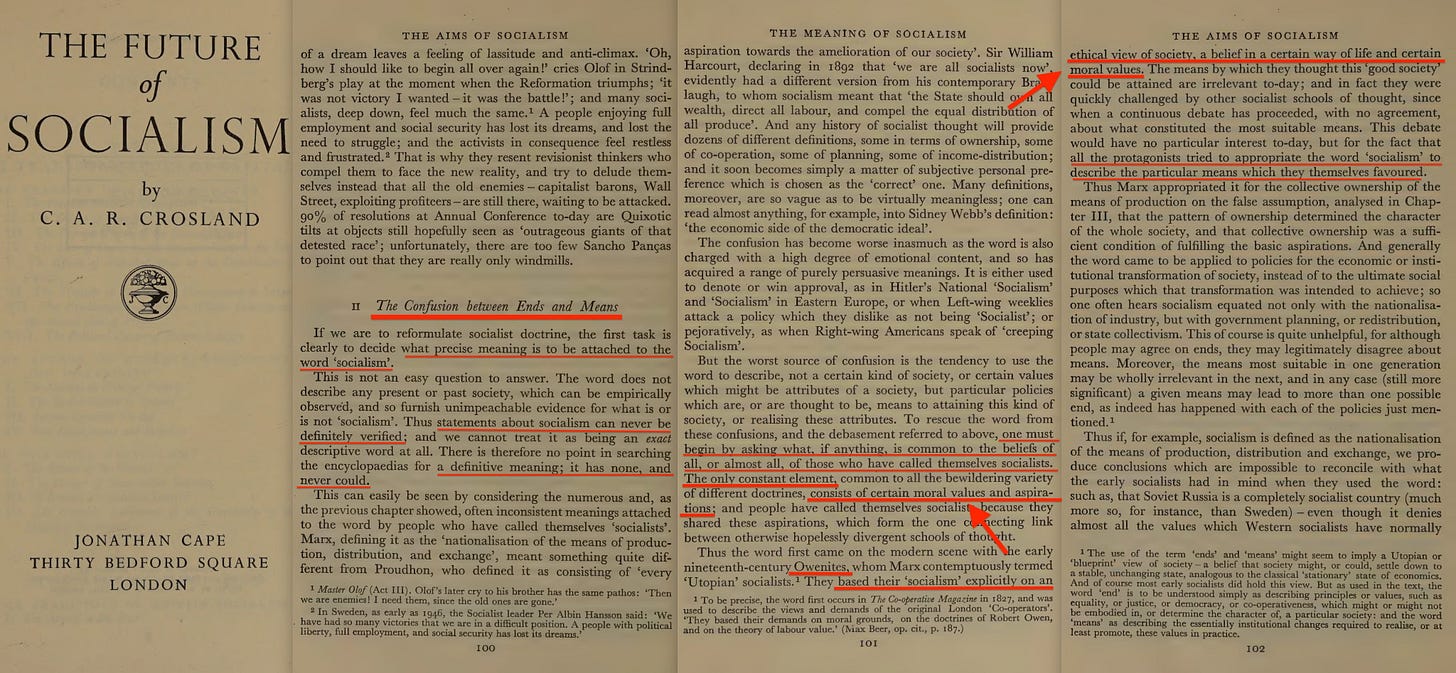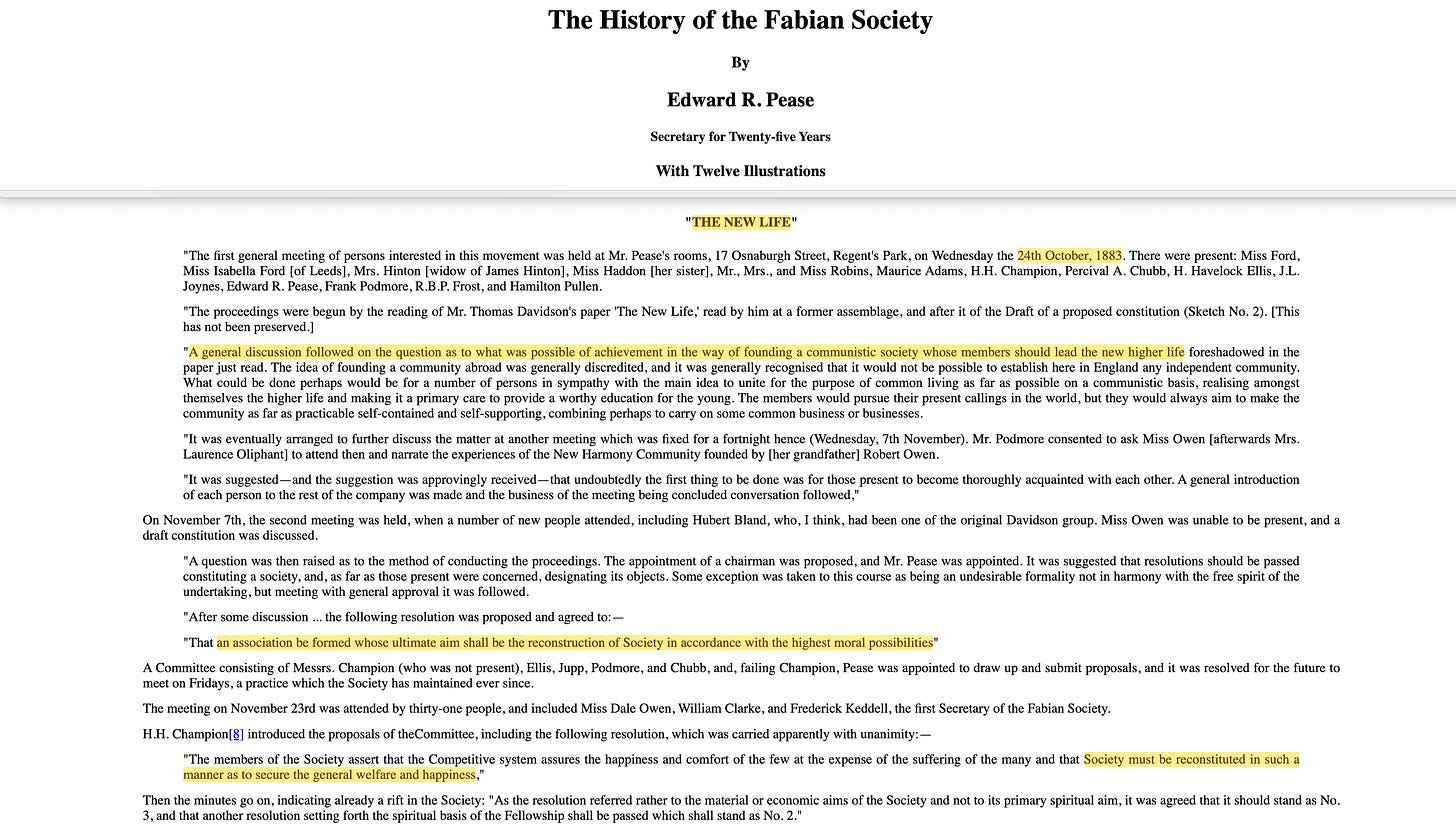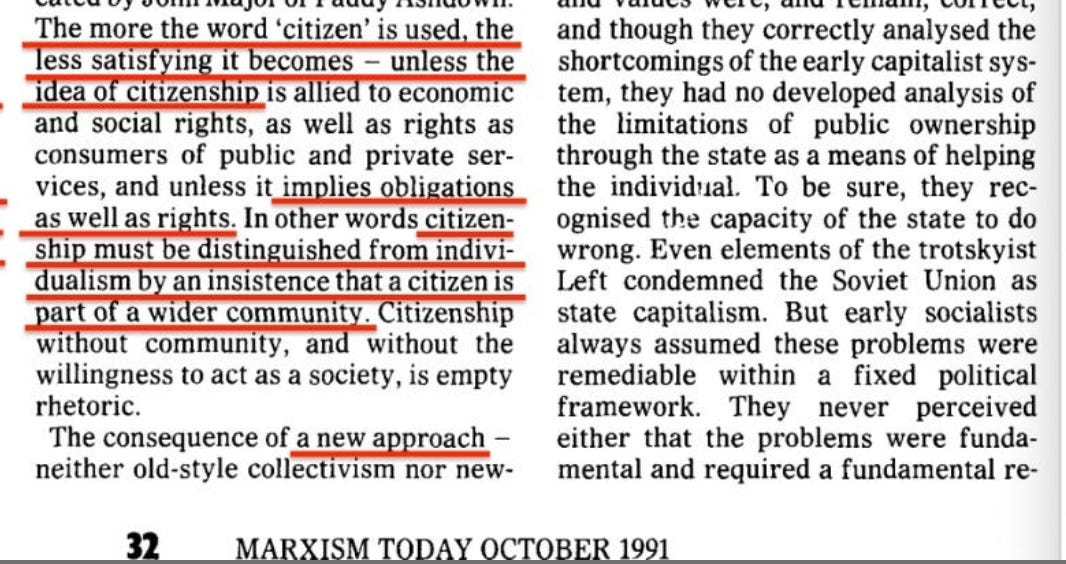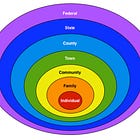Ethical Socialism
Spend enough time reading material from the Fabian Society, and one question above all demands an answer:
What exactly is ethical socialism?
In 1956, Anthony Crosland of the Fabian Society delivered his verdict. The term ‘socialism’ is meaningless1. It's an aspiration towards a common set of ethical values, where those ethics are, in effect, arbitrary. Consequently, socialism in itself is an abstract. It relates to a quality, a value, but what that value is goes undefined. Socialism, thus, is a template. It's a description relating to an ethical quality, relating to the servicing of a societal good—but with no set objective of what that entails.
Communism, by contrast, relates to materialism—dialectical2 and historical3. It judges society through the lens of materialism to determine the appropriate response to any given situation. Consequently, materialism adopts a monistic function and takes on a quality that can be described as materialistic monism4. The correct behaviour of society at large, thus, would logically become a behavioural quality, an ethic centred around materialism. Hence, communism can here be described as materialistic socialism.
Scientific socialism, however, relates to scientific monism5, which considers not only the materialistic aspect but also the scientific method itself. In this sense, scientific socialism is a ‘fuller’ version than Marx's, where the centrally determined ethical response could relate to materialism but might also extend to other aspects of science—such as its organisational dimensions.
However, science by itself cannot steer a society, because science itself is numbers, statistics, and observations, none of which necessarily relate directly to humanity. Science is an abstract, much like socialism itself.
To solve this issue, science must be transformed into an impulse—a reason to act: atmospheric apocalypse, biodiversity breakdown, climate change, ecosystem extinction, human health havoc, planetary plagues. Science must, in other words, be converted into an ethic regulating behaviour.
When the Fabian Society formed in 1884, they described themselves as ‘ethical socialists’, seeking ‘the reconstruction of society in accordance with the highest moral possibilities’6. And though this focus gradually changed, passing through Crosland's 1956 book titled The Future of Socialism, in 1990 it eventually landed on communitarian ethics inspired by Ethical Socialism. And it was this type which Tony Blair settled upon as his general vision.
When he, in 1991, penned an article in Marxism Today7, he detailed a vision in which the antagonism between the public and private should be refocused upon cooperating for the common good—though both parties would have to accept some level of responsibility in this regard.
And his 1998 vision detailed in Fabian Society Pamphlet 588, ‘The Third Way’, further detailed that this vision should be accompanied by civil society organisations, which, through Wolfgang Reinicke's Trisectoral Networks, essentially operate to set the ‘common good’ objectives—though where Reinicke's vision referred to General Consultative Status NGOs and the United Nations system as a whole, Blair kept it somewhat more modest, staying on the British Isles instead.
But while we have a general outline, we could do with something more concrete. Fortunately, in 1994, the Fabian Society published a speech by Tony Blair as their Pamphlet 5658.
This document begins by making it clear—this is the future Prime Minister of the United Kingdom, and yes, it very much relates to Socialism. In fact, chapter one is titled ‘Ethics, Marxism and true socialism’, should there be any confusion.
It outlines the three stages of economic development in the 20th century: first, power was concentrated with institutions; then people had enough of their collectivist abuse of power; and now we are heading for a third stage, where all the chestnuts of socialism rear their heads again:
‘The public is once again ready to listen to notions associated with the Left—social justice, cohesion, equality of opportunity and community. They do not want to go back; they want to move on… vision of the country's future that is both radical and modern… this is not a break with its past or its traditions but, on the contrary, a rediscovery of their true meaning.‘
Blair identifies the two broad strands of socialist thought—ethical socialism, and ‘a quasi-scientific view of socialism’, which, in the context of Marx, centers around ‘economic determinism’. He outlines Labour’s past flirtations with the latter but states unequivocally that they must return to the former, centred around ethics.
Chapter Two opens by stating, ‘socialism as defined by certain key values and beliefs is not merely alive, it has a historic opportunity now to give leadership‘. Blair, who won the 1997 General Election9, continues by adding ‘individuals cannot be divorced from the society to which they belong. It is, if you will, social-ism‘, only to continue:
‘It contains an ethical and subjective judgement that individuals owe a duty to one another and to a broader society - the Left view of citizenship.’
This is an interesting inclusion, as his Marxism Today article outlines a strategy of reframing the individual as a ‘citizen’, as it entails responsibilities to society.
’… it is only through recognising that interdependence and by society as whole acting upon it - the collective power of all used for the individual good of each’
Typical socialist trope, of course, before adding:
’It does not set apart individual interests and the interests of society as the Tories do. It takes an enlightened view of self-interest and regards it, broadly, as inextricably linked to the interests of society.‘
Your enlightened self-interest, in other words, should be linked to the collective power of all used for the individual good of each. The correct term here, of course, is ‘the common good’, but we’re not quite there. But before we do arrive, he adds:
‘It then no longer confuses means such as wholesale nationalisation with ends: a fairer society and more productive economy. It can move beyond the battle between public and private sector and see the two as working in partnership.‘
His ‘The Third Way’ adds more fuel to that fire. But before we address that:
‘In all these respects, society, through government but in many other ways, is acting to promote the public good‘
And before we address that as well…:
‘A new settlement between citizen and society requires radical reform of our constitution and such reform should be pursued by a Labour Government with urgency‘
One of the very first major things the Labour Party did once in power was to reform the House of Lords10, a move which eliminated the staunch support of the Royal Family. And with them out of the way, and against the backdrop of Paul Burrell scandal, the Fabian Society published its ‘Future of the Monarchy’ pamphlet (reviewed in the substack post on International Government)11, which—in no uncertain terms—suggested the elimination of practically all of their remaining powers. The Royal Family was to be turned into a ceremonial tourist attraction, and little else.
And the template relating to the House of Lords review? Well, that too, was penned by the Fabian Society12. And they are now looking for a second round of ‘reform’ of the more permanently… fatal kind13.
As a side note—on the ‘Future of the Monarchy’ panel sat a young Waheed Alli, who, in 1998, was ennobled by—yes—Tony Blair14.
However, while the Fabians are more than happy to strip the Monarchy of power (now considering a second pass to finish them off15), they strangely have no issue with granting the Bank of England right to ‘influence’ fiscal policy (spending and taxation)—much like they ‘influenced’ Truss and Kwarteng16.
Incidentally, the Bank of England governor used to chair the Cambridge University Fabian Society17. So many coincidences.
But back on the topic of Tony Blair’s ‘Socialism’, his vision is outlined in Chapter 3:
‘The future will be decided not on the basis of pacts or deals or horsetrading between politicians or parties but through the power and energy of our ideas and our vision for the country‘
A cynic might suggest that this entails selling the voter an illusion, but let’s instead focus on the primary topic:
‘This is a time in which we will make our own history; not power at the expense of principle, but power through principle and for the purpose of the common good‘
Et voilà. Finally, the pamphlet poses a rhetorical question:
‘What does ‘ethical socialism', the new buzz-phrase of the Left, mean?‘
Well, it’s fairly simple. It’s a partnership for the common good. And in the style of Blair’s Third Way, it’s a public-private one.
In 1998, Blair, of course, penned ‘The Third Way’. Beyond the inclusion of civil society organisations as the setters of the ‘common good’, he also emphasised the principle of ‘Subsidiarity’, which promises to ‘decentralise to the lowest appropriate extent’, without caring to mention that this ‘lowest extent’ in terms of global matters…
And to that extent—per the pamphlet itself—we need ‘global governing institutions‘ and ‘stronger international institutions‘ as issues relating to ‘pollution are international’. And Tony Blair’s solution in that regard comes down to ‘legally binding targets for pollution reduction, policed at international level and subject to international agreement‘.
In case I have not made myself perfectly clear—
Through these three documents, Tony Blair is calling for public-private-partnerships to cooperate for the common good, with unelected Civil Society Organisations (CSOs) involved in determining what that ‘common good’ even entails. One such issue is environmental pollution, which, according to Blair, should be policed at international levels through (stronger) global institutions.
And citizens—not individuals, as that term does not reflect responsibilities owed to society—working together to achieve this ‘common good’ is what constitutes ethical socialism in Blair’s vision.
And we could further consider that, as environmentalism ultimately relates to science—of dubious quality—the corresponding ethic aligns with the fundamental mechanism laid out by Alexander Bogdanov and his fellow scientific socialists.
In closing, the Fabian Society18 still very much pursues a strategy rooted in ethical socialism19. The very same approach that aligns squarely with the Caux Round Table’s concept of Moral Capitalism20, called for by not only the World Economic Forum21 in 2014, but also Lynn Forrester de Rothschild’s Inclusive Capitalism22.
Postscript: Upon completion I suddenly realise that socialism as a concept can broadly be understood as an organisation, without a clearly defined purpose.
But should you prefix this by ‘Utopian -’, ‘Marxist -’, ‘Ethical -’, ‘Scientific -’, ‘Fabian -’, or even ‘Democratic Socialism’, then the organisational purpose becomes more clear. Thus, ‘Socialism’ in this regard refers to an organisation, focused on a particular… quasi-monism.
In fact, in this light, Bogdanov’s Tektology is starting to appear as though it could be interpreted as ‘Systems Socialism’.




























